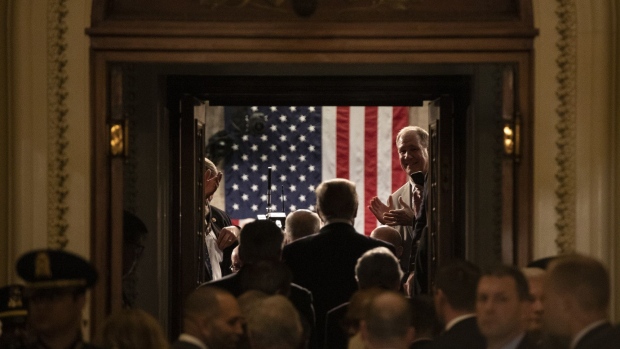Feb 4, 2020
Trump's State of Union seeks shift from impeachment to economy
, Bloomberg News

President Donald Trump plans to use Tuesday’s State of the Union address to try to move past his impeachment and make his case for re-election by taking credit for a strong economy, newly signed trade deals and a crackdown on immigration.
Trump said he plans to deliver a “positive” speech -- boasting of his achievements in front of an audience that will include as many as five of his potential 2020 opponents -- at a time when he has been fuming at Democrats over his impeachment.
Some of Trump’s GOP allies are urging him not to use his prime-time address to air grievances with Democrats over an impeachment that originated with a near party-line vote in the House and likely will end on Wednesday with an acquittal in the GOP-controlled Senate.
“Why should he talk about impeachment when we have the hottest economy in history?” Senator Mike Braun, an Indiana Republican, said.
It is the second straight year Trump will deliver his address to the nation beset by a major political crisis. The president was forced to postpone last year’s speech due to a record-long government shutdown that stemmed from a fierce battle with congressional Democrats over his demand for money to build a wall along the U.S. border with Mexico.
The speech comes a day after the Iowa caucuses, the first contest in the race for the Democratic nomination for president. Trump has sought to elbow Democrats out of the limelight by holding rallies in the region and sending surrogates to campaign in the state.
Trump will make the central theme of Tuesday’s speech what he calls the “Great American Comeback,” according to a senior administration official who previewed the speech for reporters.
‘Head-On Kind of Guy’
The president plans to address the economy and trade deals with China, Canada and Mexico, the official said, which would echo key themes he uses in campaign rallies. He’ll also discuss his efforts to crack down on illegal immigration and lower prescription drug prices.
Trump has sought to motivate his supporters and raise money by railing against Democrats over impeachment. But the administration official didn’t say whether Trump plans to bring it up in the speech.
“There’s plenty to talk about and it’s an opportunity to move on,” said Senator Roy Blunt, a Missouri Republican. “But the other option is to address it head-on and he often is a head-on kind of guy.”
Trump must also decide whether to use the speech to signal that he wants to work with Democrats to pass legislation in the coming months. The president on Sunday said impeachment makes it difficult to work with the Democratic leaders, House Speaker Nancy Pelosi and Senate Minority Leader Chuck Schumer.
“I’d like to, but it’s pretty hard when you think about it because it’s been such -- I use the word ‘witch hunt,’ I use the word ‘hoax,’” Trump said in an interview with Fox News host Sean Hannity.
The address is expected to be relatively light on new policy announcements, a tacit acknowledgment of how difficult bipartisan cooperation will be in an election year.
White House officials have been drafting the speech for weeks, though the official said the president has the final say and that last minute changes could be made.
Senior White House adviser Stephen Miller and Joe Grogan, director of the Domestic Policy Council, both traveled with the president to his Mar-a-Lago resort in Palm Beach, Florida, last weekend to work on the speech, according to a person familiar with the matter.
Trump’s acquittal in the impeachment trial became all but guaranteed on Friday after senators voted against having witnesses to testify about the president’s alleged effort to pressure Ukraine to investigate former Vice President Joe Biden, a top contender for the 2020 Democratic presidential nomination, and his son Hunter, over their dealings in the Eastern European country.
Partisan Rift
The outcome has left members of both parties even more divided, with Democrats accusing Republican senators of conducting an unfair trial by blocking witnesses and documents. Several Republicans have said while they don’t condone Trump’s conduct, they also do not view it as impeachable.
Five Democrats who are vying for their party’s presidential nomination to run against Trump are lawmakers and could be present in the House chamber for his address: Senator Elizabeth Warren, Senator Bernie Sanders, Senator Amy Klobuchar, Senator Michael Bennet and Representative Tulsi Gabbard.
Past presidents have made a call for unity in their addresses to the nation. Trump used his 2019 State of the Union to inflate his economic achievements and tout numbers that didn’t match up with official data.
Polls show the economy is a bright spot for the president. A Washington Post/ABC News poll released late last month showed 56 per cent of Americans approve of the president’s handling of the economy, up 10 percentage points since September to a high for Trump’s presidency.
In his Sunday interview, Trump said low unemployment and declining poverty among racial and ethnic minorities has created a “positive revolution.”
“I don’t know how anybody could possibly beat me with that vote,” he said.
Trump will attribute the strong economic indicators to “phase one” of a trade deal with China and a revamped trade pact with Mexico and Canada, the official said, as well as other initiatives.
Trump will make specific requests for Congress to act on health care, according to the official. Trump has long spoken about working with congressional Democrats to lower the price of prescription drugs, but the two sides have disagreed on how to achieve that goal.
The White House last year threatened to veto a House-passed proposal that would require the government to negotiate drug prices for Medicare and other insurance plans. It has thrown its support behind a bipartisan Senate bill that also has little chance of becoming law.
--With assistance from Jennifer Jacobs, Laura Davison and Daniel Flatley.








